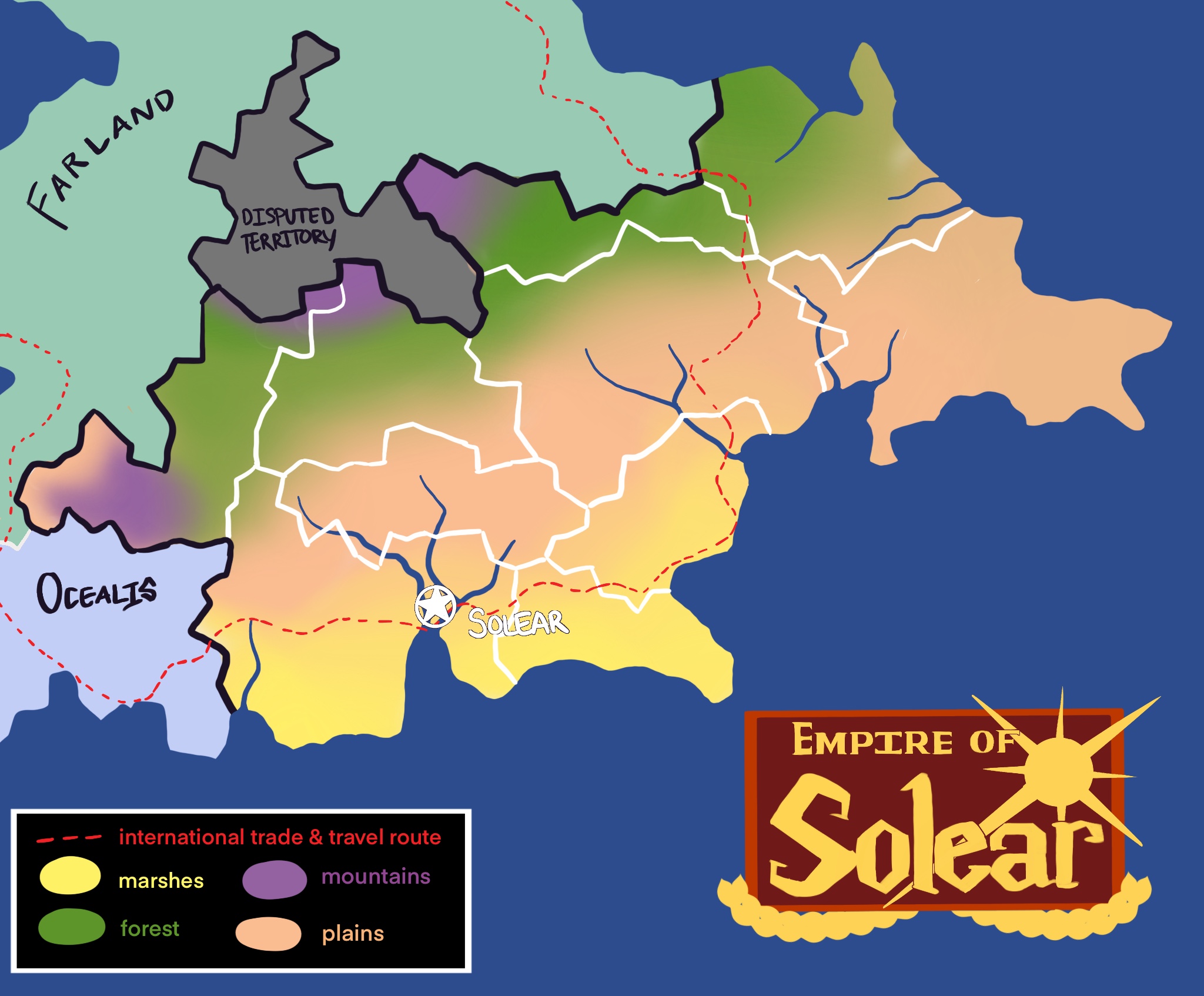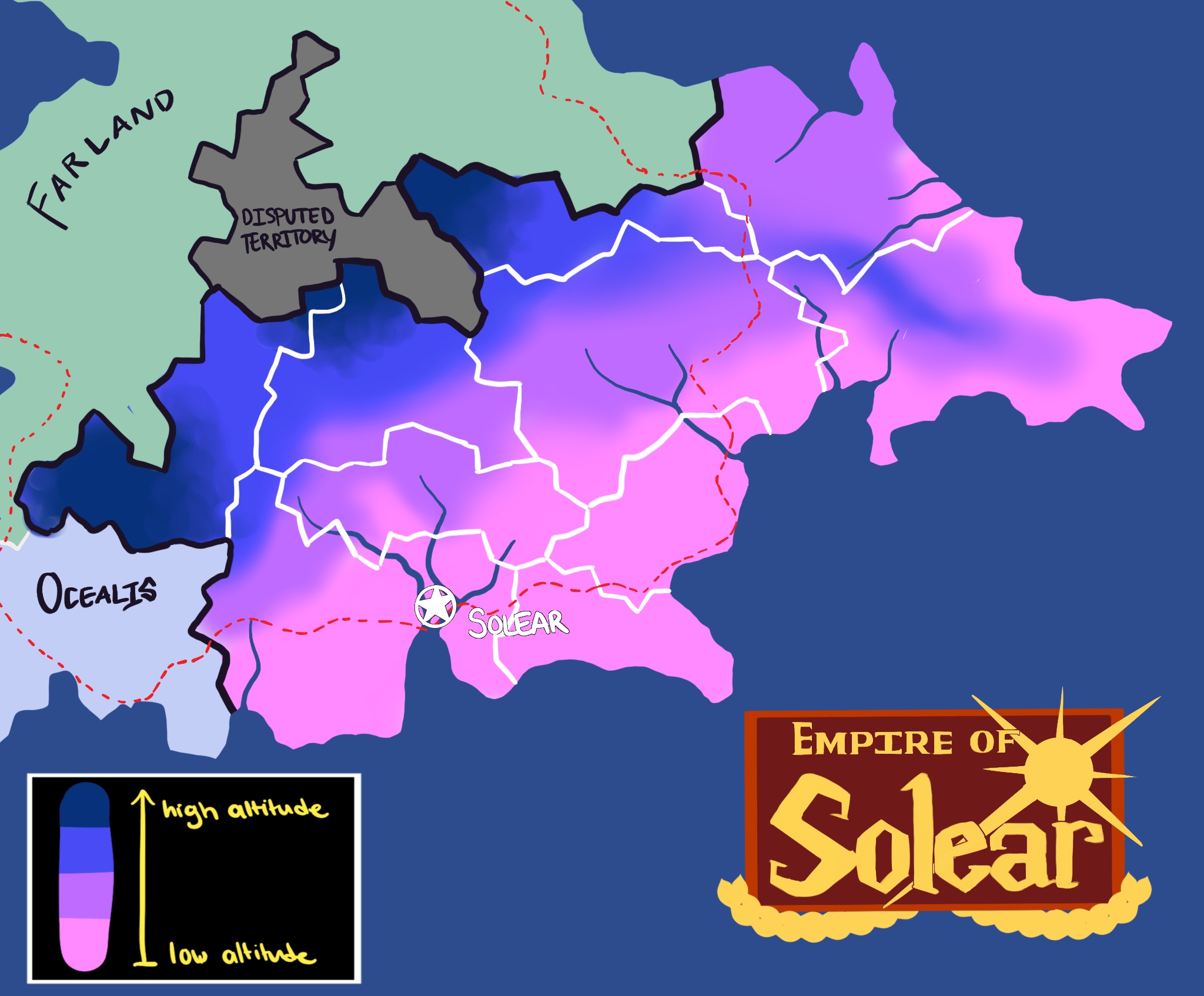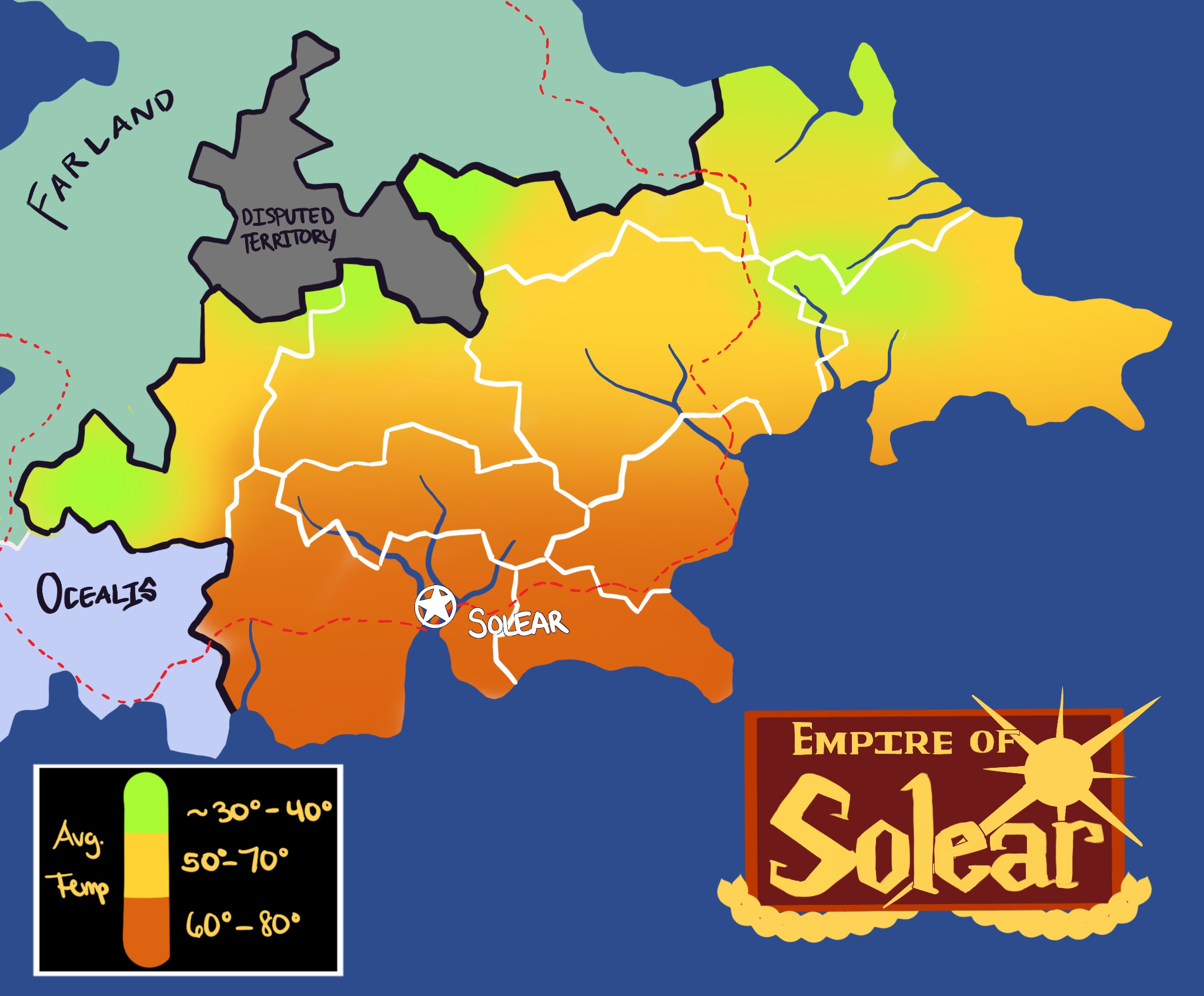The Solearan Empire (Solear)
Temperatures range from temperate to tropical, getting warmer the more you go south. Rainforests and wetlands scatter the southern coast, while flatlands and plains make up the east coast. The Kingdom is known for its intense diplomacy, and shares borders with its allies Farland and Ocealis, both of which were former colonies of the former Empire. Ruled over by his Imperial Highness Emilio.
GOVERNMENT
The Empire is split into 10 different territories, with 9 provinces and one main territory (which is where the capital city of Solear resides). His Imperial Majesty Emilio is figurehead of the empire, and makes governing decisions with The Assembly of Representatives from each province. The Emperor must approve of the laws which The Assembly of Representatives want to pass on an Imperial level. The Emperor may also pass Imperial Decrees, but these must be approved by 5 Representatives.
The Assembly of Representatives
The Assembly of Representatives is made of 9 representatives, all of which decide on which laws to pass on an Imperial level. Representatives are also in charge of approving laws within their province, but do not write laws themselves. Representatives are elected by citizens of each province (though it should be noted that the position of Emperor is not elected unless there are extenuating circumstances). Elections for Representatives are held every 4 years.
Heads of Community
Laws are usually written by a Head of Community. This can be (but is not limited to) a mayor, a chief, or an elder. The Heads decide with their community what laws to bring to the Representatives within The Assembly. Heads must choose carefully what laws to bring to Representatives, as there are only 2 meetings between Representatives and Heads every year. Additionally, Heads are limited in the amount of laws they may propose (and there is no guarantee that the laws will be approved by a Representative).
POLICIES OF NOTE
Marriage
Interracial marriage used to be criminalized in outer provinces, but is now completely legal after several decades of activism. Families are recognized and are able to seek out fertility services, and an anti-discrimination policy throughout Solear puts this into writing. However, the policy is far from perfect. Solearan scholars, activists, and lawmakers continue to deconstruct the human-centric structures within the Empire.
Same-sex marriage is also legal in the Empire and families are recognized and are able to adopt. While there are no formal policies that state this outright, the rights of same-sex married couples are included in the Empire’s Interracial Anti-Discrimination Policy.
Sex Work
CW: mentions of rape and sexual harrassment. Sex work (specifically escort work and brothels) are legal, being highly regulated in certain provinces and decriminalized in others. Sex workers are allowed to unionize and have legal protection against rape, sexual harrassment, and discrimination, assuming they have the proper documentation to be participating in sex work. While specific policies often vary from province to province, one must be 18 years of age to partake in prostitution.
Crime and Punishment
While information on the inside of prisons is highly classified and regulated, the Empire is well known for its use of prison labor. Much of the manual labor of construction and sanitation is done by prisoners. Inmates are paid at pennies an hour, making them a lucrative source of labor for the Empire.
SOLEARAN CULTURE
Imperial Succession
The process of choosing the next emperor is one that may go on for decades, depending on the lifespan of the current emperor. When an Emperor has a child, the line of succession goes directly to the child and they are trained accordingly. This, however, is frowned upon. It is believed that having several children means that heirs to the throne must prove their worth, making them stronger leaders in the long run. In the event that an Emperor has several children, the siblings must prove themselves to the Empire and the Emperor, competing throughout their lives in trials to gain the title of heir to the throne. The nature of these trials have differed throughout history, but there is no time limit nor restrictions to when or how an heir is selected.
The current selected heir to the throne is Imperial Prince Diego of the Giordano Family.
Trials under His Imperial Highness Emilio
While the process of proving oneself has changed throughout the centuries, His Imperial Highness Emilio is responsible for the wider understanding of proving oneself throughout the empire due to the very public process he has conducted for his own children. His children are expected to prove themselves in the traditional ways (through intelligence, diplomatic skill, leadership competence, etc.) and are also expected to participate in gladiatorial combat in Solear’s colosseum. This not only creates a relationship between themselves and the citizens of Solear, but is also a show of strength in battle.
In more recent decades, the gladiatorial trials have become a lucrative source of revenue for the Giordano Family. It is speculated that almost half of the money within the Imperial Treasury comes from these trials. To the citizens of Solear, Imperial bloodsport is a common past-time and conversation topic. Betting on the outcome of gladiator matches is not uncommon. The wealthier Solearans sometimes sponsor their favorite gladiators as well, tipping the scales of bets (as well as Solear's future politics) in their favor.
Multiculturalism within the Empire
While Solear’s population demographic is expansive and diverse, the empire was originally a smaller coastal country which was predominantly human. As the Empire expanded, individual provinces began to take on cultural customs and policies for different races. Solear lacks a national language or religion, priding itself on embracing all races and gods of worship. However, this is not always the case.
Racial Issues
A long-standing issue within Solear is the separation of races. While there were no strict borders established for different races to live in, it was a common struggle to find accommodations for size differences, cultural differences, or language barriers. Interracial marriage was not recognized within the empire until the reign of His Imperial Majesty Emilio. This policy of racial separation was originally enacted to prevent social climbing & class dissemination (as most non-human races lived in the provinces, territories which required their residents to stay poor and exploited for the Empire to continue conquering). As a whole, other races besides humans were considered (and, arguably, continue to be considered) as an afterthought throughout the empire.
MAPS
For a closer look, open images in new tabs.



